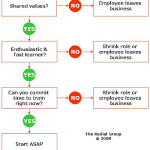In Part 1, we looked at big-picture financial and business reasons that wellness businesses should consider an outside marketing agency.
This week, we look at reasons not to go with a digital agency — at least, not right now.
6. You know who your ideal client isn’t.
If you’re not clear on the market segments you want to avoid, work with your marketing team or agency to figure this out before you embark on actual marketing campaigns and initiatives.
Online marketing is most successful when it targets your ideal client. Developing potential clients costs time and money. It’s important to be clear about who you want to target — and who you absolutely don’t want to target.
A good agency combines industry experience, project-specific research, and analysis of your data to dial your targeting in. They’ll tell you who to reach and who to avoid, and design campaigns to deflect people who aren’t likely to be a fit.
Wellness businesses often fall into the trap of targeting every living, breathing adult in their geography. Seriously. Every man and woman, ages 18 – 65+. That actually IS every adult.
But your spin cycling boutique’s best clients probably aren’t adults in their 60s. The ideal target for your weight loss program probably isn’t 18-24 year-old guys. If your track record is developing soccer athletes, basketball players aren’t your best prospect.
Yes, you might occasionally land a member from one of those unlikely segments — but you shouldn’t actually spend money trying to reach them.
Plus, targeting a really broad audience usually makes all of your marketing less effective. It drives businesses towards one-size-fits-all messaging, which really means “one size fits no one,” in our experience. The result: you don’t even win the business that would be a great fit for you!
You need alignment of interests, active curiosity, and a ability and willingness to spend money.
A commitment to “qualifying out” unsuitable leads greatly increases your ROI from your marketing agency and your marketing budget.
7. You know what business success looks like.
If you’re not sure about which business goals you’re aiming for, work with your agency to sort that out before you go all-in on any actual marketing activities.
Forget clicks and conversions and the ever-elusive “engagement” for a moment.
How will you really know when your campaign is successful?
Is it when:
- 100 new wellness center members walk in the door after your month-long promotion?
- When your recurring yoga student revenue grows by 20%?
- You have enough demand to support a new six-week Phase 3 module for your healthy lifestyle coaching program?
- Your “Surviving Menopause” program doubles enrollment?
- Your Ironman training group has a waiting list?
- When your cash flow grows 10% three months in a row?
If your marketing team can’t help you clarify goals, it makes sense to get outside help, especially if you want more insight into similar businesses.
Just remember — hold off on jumping into the deep end of the marketing pool until you’ve got clarity about what business success looks like.
8. You’re not trying to outsource what matters most.
Sometimes marketing isn’t really the problem that needs solving first.
Here’s what I mean.
Your business is full of health and wellness experts — not tech gurus, or accountants, or lawyers — so it’s an easy call to get outside help.
The same thing goes for marketing.
If you:
- Know how to hire and manage a crackerjack marketing team
- Can afford to hire all the different experience you need — from high-converting landing page and home page design to persuasive content to SEO content to video storyboards to postcard copy to pay-per-click management…and on and on.
- Can build a team that’s already completely up to speed on the latest nuances of platforms like Google, Facebook and Instagram — and stays current as those platforms change…
Then you should do it. Otherwise, offload it to experts.
However — wondering if you should outsource marketing may simply not be the right question.
Does any of this sound familiar?
- You don’t have a team that can develop programs and services.
This stuff is core to your vision for your business. It’s not a marketing problem. If you can’t build the ability to do this consistently over time, you can’t succeed.
- You don’t have people in-house with a track record of selling this type of program or service.
If your team can’t successfully sell your own programs, there is no point in paying to market them. You have to fix this issue first.
- Your client-facing customer service is extremely thin and delivered by low-paid low-skill employees.
It’s not like your customers aren’t gonna notice, right? And then, they stop showing up and they post critical comments on Google and Facebook and Yelp and you will be done and gone in a year or two.
Again, not a marketing problem.
These are core activities of your business. If you can’t handle those things, you won’t be able to keep the customers you win.
We talked to someone recently who has a new multi-week program. She thought it would be easy to get people to sign up. But they haven’t. Only a few signed up, and they didn’t attend for long.
Clearly, something’s off — about how she tried to recruit participants, about the fit between the participants and the program, and quite probably about the actual content, design and/or quality of the program itself.
If you have a problem finding the right prospects for your program — we can help with that. We can even help you fix a broken sales process.
But honestly, if people don’t stay engaged with you once they’re clients, members, patients or customers….part of the problem is almost always your program or service or overall customer experience. It is broken somehow.
Unfortunately, you can’t market your way out of that.
9. You know it takes professional skill.
If you still think that you can get great results with freelancers, interns, and newly minted community college grads, don’t bother talking to an agency.
Here’s what I have seen over 15 years of signing new clients who tried this route: these folks never have the experience and training, they don’t stay current, they spout outdated, often harmful old wives tales about SEO and social media, they definitely don’t understand the nuances of all the platforms, and they never spend their own money on the professional tools to actually do a good job.
These days, online marketing mixes creativity, customer insight and industry experience with financial analysis, data analytics, and technology.
There are actually several models that do work well if you’re thinking about outside marketing help. For example:
- You can outsource your entire marketing organization. We have some clients where we act as Chief Marketing Officer and provide all the day-to-day marketing functions too — web copy, landing page design, product marketing launches, video production, Facebook/Instagram and Google Ads PPC management, print marketing and so on.
- A hybrid model: you have a couple of good internal people and bring us in primarily in a Chief Marketing Officer role — for strategy, driving lead generation, the marketing plan and calendar, content strategy, and heavy coaching/mentoring of the internal team to bring them up to speed.
- Strategic projects: Your good in-house team handles everyday marketing and we work on specific projects, like Google Ads and Facebook Ads or video ads or postcard campaigns, where they lack bandwidth or expertise.
10. You know your business really well.
If you don’t know your customers and programs backwards and forwards, you really don’t need a marketing agency. People like us rely on people like you to know your business top to bottom.
When you know your business really well — who are your best prospects are and why, the real reasons customers love you (hint: it’s never price), what’s truly special about your programs and services — you’re ready to partner with a marketing agency.
They’ll take your insights, add their own, based on experience and client-specific research, and partner with you to help you understand the best ways to reach, engage and convert prospects into paying clients.
You can expect them to analyze your sales funnel and marketing stack end-to-end, so you understand how to measure success, where strengths and deficiencies lie, and which campaigns, initiatives and marketing activities will generate the best return on investment now and in the future.
A great agency is a true partner, someone who’s always on your side and always supports you in making informed decisions about what’s truly right for your business.



